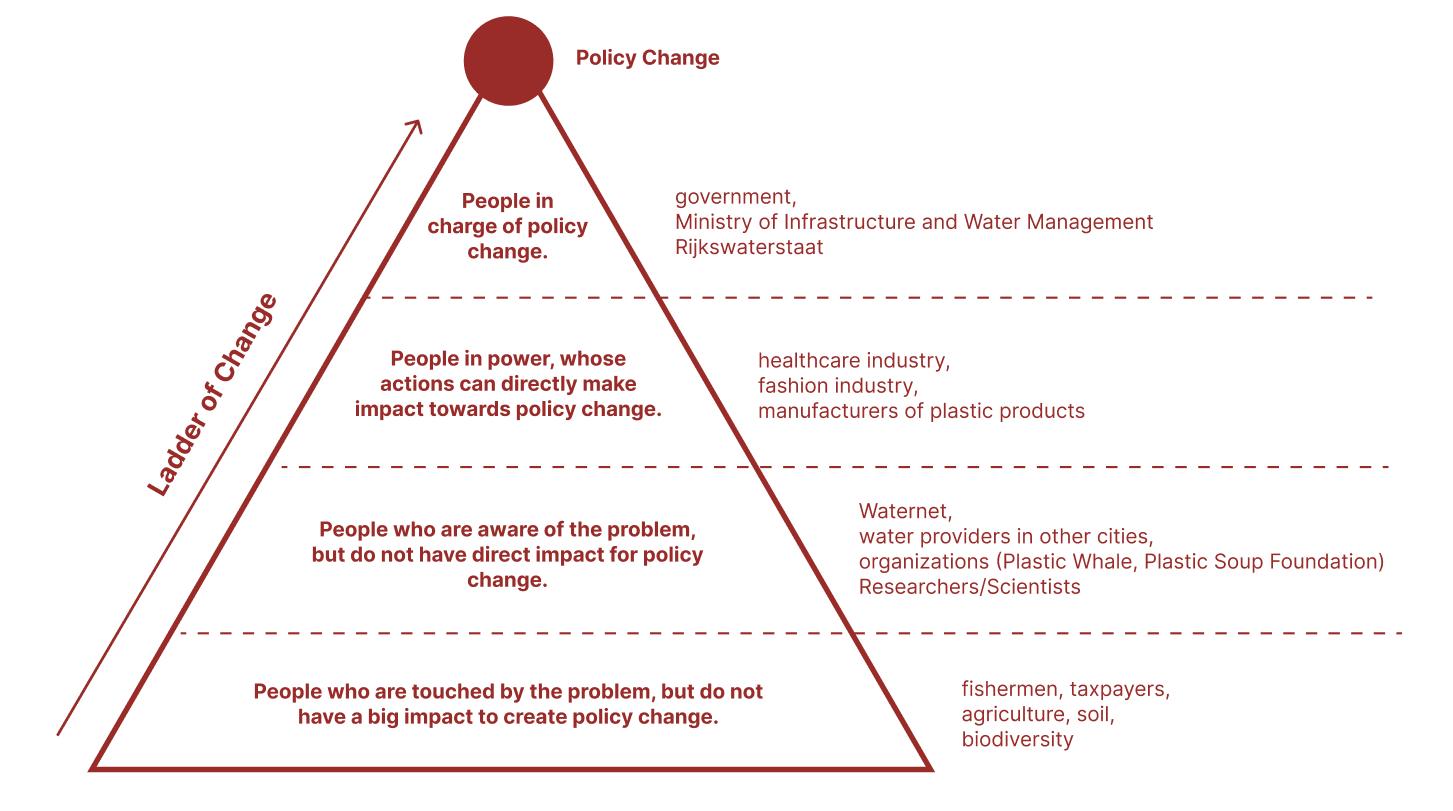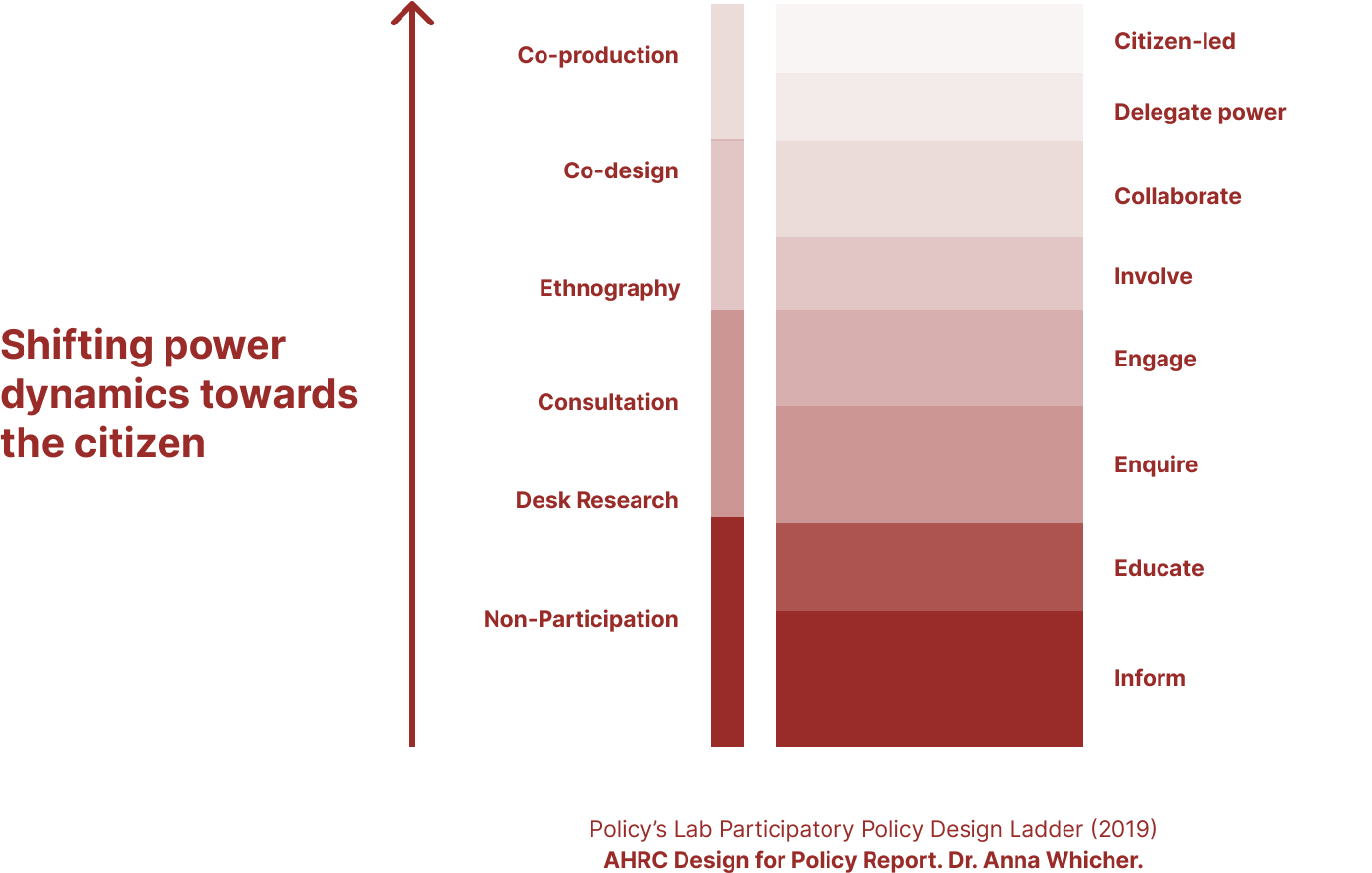background
This project is a response to the microplastics crisis affecting Dutch canals in cooperation with Waternet, the main water provider for Amsterdam.
The brief was to tackle the problem of microplastics in Dutch canals with the goal of creating a provocative prototype in order to trigger some conversation regarding policy change.

Problem space
The client wanted us to create a project that would be able to stir some level of conversation, enough to create awareness with concerned citizens, and ideally policy change on the longer term.
Our Ladder of Change is a list of stakeholders effecting and being effected by the microplastics crisis. It’s also a list of the level of influence each stakeholder has on the end goal.
The main problem facing Waternet is the fact that there are no policies currently being implemented to tackle the microplastics issue on a legality level, even though the issue is extremely urgent.
The client wanted us to create a project that would be able to stir some level of conversation, enough to create awareness with concerned citizens, and ideally policy change on the longer term.
Our Ladder of Change is a list of stakeholders effecting and being effected by the microplastics crisis. It’s also a list of the level of influence each stakeholder has on the end goal.

Ladder of Change

Strategy
Our strategy was heavily influenced by the Policy Co-Design Playbook by OpenResearch Amsterdam where we aimed to shift the power dynamics towards the citizen by informing and educating them enough to get them to start enquiring, engaging and then taking actions that are self-initiated. This way the project can have a longer-lasting and more sustainable effect.
Our strategy was heavily influenced by the Policy Co-Design Playbook by OpenResearch Amsterdam where we aimed to shift the power dynamics towards the citizen by informing and educating them enough to get them to start enquiring, engaging and then taking actions that are self-initiated. This way the project can have a longer-lasting and more sustainable effect.
Stakeholders
The stakeholders involved were particularly challenging as there was a rift when it came to levels of people working at Waternet.
We were in discussion with people from middle management who were classified as lesser stakeholders, as they are not the ones taking direct action towards policies. However, the upper management employees were the ones influencing bigger, more impactful decisions that have more power in relation to policy change.
identity
We implemented this strategy with speculative design by creating BioBliss, a fake high-end wellness company creating treatments and cosmetics for a highly-commodified future living with microplastics, where only those who can afford it can survive.
Alongside the brand, we created a set of 3 speculative products (material speculation) designed for 3 different futures. We wanted to create a project dystopian and shocking enough so that it was bound to stir up conversation in light of the importance of policy change.
We implemented this strategy with speculative design by creating BioBliss, a fake high-end wellness company creating treatments and cosmetics for a highly-commodified future living with microplastics, where only those who can afford it can survive.
Alongside the brand, we created a set of 3 speculative products (material speculation) designed for 3 different futures. We wanted to create a project dystopian and shocking enough so that it was bound to stir up conversation in light of the importance of policy change.
minimal Logo + generic slogan

1. The co-exist collection
The Nano-Plastic Fingerprick Analyzer

The collection
A future where policy changes never happened, microplastics have infiltrated our blood systems through contaminated food, water, and cosmetics. bio.bliss has designed a new collection to help manage and prevent the high concentrations of nanoplastics in our blood.
A future where policy changes never happened, microplastics have infiltrated our blood systems through contaminated food, water, and cosmetics. bio.bliss has designed a new collection to help manage and prevent the high concentrations of nanoplastics in our blood.
The product
The Nano-plastic Fingerprick Analyzer uses state-of-the-art technology to accurately detect the presence of nanoplastics in just a few simple steps. it also includes an emergency anecdote vial to remedy a high nanoplastic concentration.
The Nano-plastic Fingerprick Analyzer uses state-of-the-art technology to accurately detect the presence of nanoplastics in just a few simple steps. it also includes an emergency anecdote vial to remedy a high nanoplastic concentration.
2. The prevention collection
The Bethnic Clearing Capsules
![]()

The collection
A future where policy change strategy is mostly for prevention. bio.bliss has designed a product with the latest Bethnic technology to filter food and water from microplastics.
A future where policy change strategy is mostly for prevention. bio.bliss has designed a product with the latest Bethnic technology to filter food and water from microplastics.
The product
3 small capsules that contain natural zooplankton to effectively filter out harmful micro-plastics, ensuring that your meals and beverages are as pure and clean as can be.
3 small capsules that contain natural zooplankton to effectively filter out harmful micro-plastics, ensuring that your meals and beverages are as pure and clean as can be.
3. The Future-forward collection
The Cotton Serum

The collection
A future where policy change to ban all plastic is implemented. Fast fashion and cheap quality products are dead. bio.bliss has designed solutions to grow your own raw material at home.
A future where policy change to ban all plastic is implemented. Fast fashion and cheap quality products are dead. bio.bliss has designed solutions to grow your own raw material at home.
The product
This unique and innovative serum is specifically formulated to help you grow your own cotton with ease and success. The Cotton Serum is made from a blend of specially selected nutrients and growth factors that are essential for healthy cotton development.
This unique and innovative serum is specifically formulated to help you grow your own cotton with ease and success. The Cotton Serum is made from a blend of specially selected nutrients and growth factors that are essential for healthy cotton development.
The platform
I designed and developed a faux eco-commerce platform for bio.bliss so shoppers can learn more about the collections and products. As the users scroll and shop for the products, they will be faced with a message shifting them back to the reality of now.
Results
The project was a representation (and conversation starter) of a highly-commodified and opportunistic future of society.
The project was displayed at the Master Digital Design final exhibition and was met with some surprise.
Initial reactions were that most visitors were shocked at the high prices for the products, and couldn’t imagine purchasing them in real life. The shock factor was relaized even further when visitors tried to imagine a future where these “luxury items” were to become a necessity, as is the case with many medicine nowadays such as insulin.
Some of the participants we had initially tested our concept validations on gave us feedback on how they think of microplastics now more often than they used to as a result of our project.
For now, the project simply redirects to the Plastic Soup foundation where users can take initiative into educating themselves on microplastics issues. The team and I have ambitions in producing the actual 3 products and selling them as tokens of what could be the reality in the future.
For now, the project simply redirects to the Plastic Soup foundation where users can take initiative into educating themselves on microplastics issues. The team and I have ambitions in producing the actual 3 products and selling them as tokens of what could be the reality in the future.